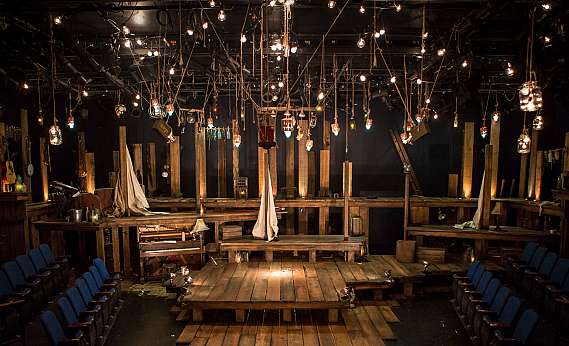David Greig might very well be the most prolific contemporary playwright Americans have never heard of. The 43-year-old Scot has written over 40 plays, adaptations and experimental pieces to this point in his thriving career. Yet only occasionally has his work been seen in the U.S. This season, however, Chicago audiences have enjoyed three opportunities to engage with the playwright’s work. In October, the National Theatre of Scotland’s world tour of The Strange Undoing of Prudencia Hart performed for
a month on Navy Pier as part of Chicago Shakespeare Theater’s World Stages series. Remy Bumppo Theatre Company concludes their current season with a production of Creditors, adapted by Greig from the August Strindberg original. And Writers’ Theatre has the distinct honor to present the first production of Yellow Moon by an American theatre company and to further introduce Chicago audiences to this remarkable talent.
David Greig was born in Edinburgh, Scotland in 1969 but spent most of his childhood in northern Nigeria. Greig’s father worked in the construction industry in the former British colony. The family returned to Edinburgh in 1980 and the writer finished his education in the United Kingdom, attending Bristol University to study English and Drama.
Greig met fellow theatre artists Graham Eatough and Nick Powell in Bristol, where the three began developing original and experimental works of theatre. They formed a theatre company named Suspect Culture whose mission was “to develop a style of theatre that combined the best of British and European traditions, working with high quality writing but giving equal weight to visual and musical elements.” The group achieved moderate success in Scotland in the mid 90s and some of their productions toured Europe.
The Citizens Theatre in Glasgow produced Greig’s professional debut in 1993 and the exposure led to commissions from the Traverse Theatre in Edinburgh, Scotland’s leading new work theatre. Europe (1994), The Architect (1996) and The Cosmonaut’s Last Message to the Woman He Once Loved in the Former Soviet Union (1999) found success in Scotland and were even produced internationally. However, Greig’s profile in the UK outside of Scotland remained limited. Greig explains, “It’s interesting that my playwriting career coincided with the devolution in Scotland, and when we founded Suspect Culture we made it very clear that we were looking out to Europe from Scotland and that we weren’t interested in London, which was quite unusual at the time—the general feeling was that you had to be accepted in London before you could go further afield.”
Greig continued writing and producing plays in Scotland for the Traverse Theatre and at the Edinburgh International Festival. In 1999, he accepted a teaching job with the Royal Court Theatre that took him to Palestine and Syria to work with young Arab playwrights. The experience had a profound effect on the writer and inspired him to include Middle Eastern culture in his plays. “I didn’t go out there with the idea of writing a play,” he explains, “but the experience of being out of one’s own culture was so strong for me that it demanded I explore it in writing.”
The year 2005 was a breakout one in Greig’s career. His play Pyrenees transferred from Glasgow to the Menier Chocolate Factory in London in March and received wild acclaim from the British press. Weeks later, a revival of The Cosmonaut’s Last Message… began performances at the Donmar Warehouse, while another original play, The American Pilot, opened at the Royal Shakespeare Company in Stratford-upon- Avon. The latter play would go on to enjoy a high-profile New York production at Manhattan Theatre Club in late 2006.
In 2007, Greig again had three high-profile productions running at the same time. The Edinburgh Festival featured the world premiere of Damascus (inspired by the writer’s experience in the Middle East), an adaptation of Sophocles’s The Bacchae starring Alan Cumming, and Yellow Moon—-a play written in a groundbreaking new style of lyrical narratives and traditional dialogue, explored further in The Brief Chronicle article “Words and Music”.
Greig’s star has only continued to ascend. He has had two adaptations premiere at the Donmar Warehouse, Camus’s Caligula and Strindberg’s Creditors. His play with songs, Midsummer, was a huge success for the Traverse Theatre, touring to London, New York, the Kennedy Center in Washington, DC, and Australia. Dunsinane, Greig’s sequel to Shakespeare’s Macbeth, wowed audiences at the Royal Shakespeare Company in 2010. And most recently, the National Theatre of Scotland’s production of his newest play, The Strange Undoing of Prudencia Hart, completed an international tour to the U.S., Canada and Australia.
All of these later plays, beginning with Yellow Moon, take their inspiration from Scotland and celebrate the history and contemporary vitality of the country. Greig—who lives north of Edinburgh with his wife and two children— is particularly proud of his homeland’s rising cachet. “When journalists from London interview me now, they often say, oh, Scottish theatre seems to be going through something of renaissance,” he says. “And I have to say, well, yes, it is an interesting time. But it isn’t a renaissance. This is something that’s been growing for decades; the difference is that now, you can see it. And that’s fantastic.”


No comments yet.